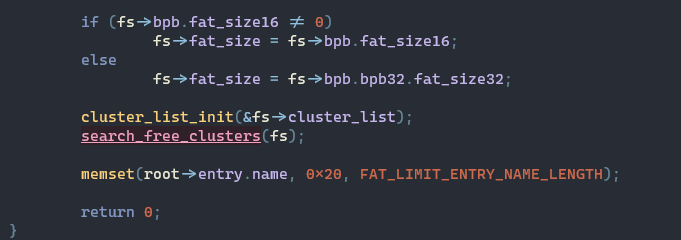여기에서는 이후 FAT 와 File System 코드에서 사용하게 될 자료구조인 Doubly Linked List ,Shell Entry 와 Shell Entry List, cluster_list 마지막으로 disksim 자료구조에 대해 소개하려 한다.
1. Doubly Linked List
Linux Kernel 의 linked list 와 거의 동일하다.
- list.h
#ifndef LIST_H__
#define LIST_H__
#include <stdbool.h>
#include <stddef.h>
#include <stdint.h>
struct list_head {
struct list_head *next, *prev;
};
#define LIST_HEAD_INIT(HEAD) { .next = &(HEAD), .prev = &(HEAD) }
#define container_of(PTR, TYPE, MEMBER) \
((TYPE *) ((char *) (PTR) - offsetof(TYPE, MEMBER)))
#define LIST_ENTRY container_of
#define LIST_ITERATOR_WITH_ENTRY(HEAD, ENTRY, TYPE, MEMBER) \
do { if (HEAD == NULL) \
break; \
\
struct list_head *__LIST_START = HEAD, \
*__LIST_END = HEAD; \
do { \
TYPE *ENTRY = container_of(__LIST_START, TYPE, MEMBER);
/*
* ...
*/
#define LIST_ITERATOR_END \
} while ( __LIST_START = __LIST_START->next, \
__LIST_START != __LIST_END ) ; \
} while (false);
#define LIST_ITERATOR_DELETE_ENTRY list_del(__LIST_START)
#define LIST_ITERATOR_BREAK break
#define LIST_ITERATOR_CONTINUE continue
void list_init(struct list_head *head);
void list_add(struct list_head *head, struct list_head *new);
void list_del(struct list_head *head);
void list_add_tail(struct list_head *, struct list_head *);
#endif- list.c
#include "list.h"
static void __list_add(
struct list_head *, struct list_head *, struct list_head *
);
void list_init(struct list_head *head)
{
head->next = head;
head->prev = head;
}
void list_add(struct list_head *head, struct list_head *new)
{
__list_add(head, new, head->next);
}
void list_del(struct list_head *entry)
{
entry->next->prev = entry->prev;
entry->prev->next = entry->next;
entry->next = entry->prev = NULL;
}
void list_add_tail(struct list_head *head, struct list_head *new)
{
__list_add(head->prev, new, head);
}
static void __list_add(
struct list_head *prev,
struct list_head *new,
struct list_head *next
) {
/*
* prev <-> new <-> next
*/
next->prev = new;
new->next = next;
new->prev = prev;
prev->next = new;
}2. shell entry
shell entry 는 shell 의 관점에서 바라본 파일 데이터 정보이다.
- shell_entry.h
#ifndef SHELL_ENTRY_H_
#define SHELL_ENTRY_H_
#include "list.h"
#include <stdint.h>
#include <stdbool.h>
struct shell_filetime {
uint16_t year;
uint8_t month;
uint8_t day;
uint8_t hour;
uint8_t minute;
uint8_t second;
} ;
struct shell_permission {
uint8_t owner;
uint8_t group;
uint8_t other;
};
struct shell_entry {
struct shell_entry *parent;
char name[256];
bool is_dir;
unsigned int size;
struct shell_permission permission;
struct shell_filetime create_time,
modify_time;
uint8_t pdata[1024];
struct list_head list;
};
struct shell_entry_list {
unsigned int count;
struct list_head *head, *tail;
};
int shell_entry_list_init(struct shell_entry_list *);
int shell_entry_list_add(struct shell_entry_list *, struct shell_entry *);
void shell_entry_list_release(struct shell_entry_list *);
#endifstruct shell_entry 에는 아래에 정보가 포함된다:
- 부모 파일 (상위 디렉터리 정보)
- 파일 이름
- 디렉터리 여부
- 파일 크기
- 파일 퍼미션
- 생성 시간, 수정 시간
- 파일 시스템을 위한 데이터 공간 (이후 설명함)
- 연결 리스트
- shell_entry.c
shell_cmd_ls() 함수가 호출했던 shell_entry_list_init() 과 shell_entry_list_release() 는 아래의 구조를 가진다. shell_entry_list_add() 함수는 FAT 와 file system 을 거쳐 호출된다.
#include "shell_entry.h"
#include <stdio.h>
#include <stdlib.h>
#include <string.h>
#include "list.h"
int shell_entry_list_init(struct shell_entry_list *list)
{
list->head = list->tail = NULL;
list->count = 0;
return 0;
}
int shell_entry_list_add(
struct shell_entry_list *list, struct shell_entry *entry
) {
struct shell_entry *copy;
copy = malloc(sizeof(struct shell_entry));
if (copy == NULL)
return -1;
memcpy(copy, entry, sizeof(struct shell_entry));
list_init(©->list);
list->count++;
if (list->head == NULL) {
list->tail = list->head = ©->list;
return 0;
}
list_add(list->head, ©->list);
return 0;
}
void shell_entry_list_release(struct shell_entry_list *list)
{
if (list->head == NULL)
return ;
if (list->head == list->tail) {
list_del(list->head);
return ;
}
for (struct list_head *first = list->head, *last = list->tail, *backup;
first != last;
first = backup)
{
backup = first->next;
free(first);
list_del(first);
}
list->head = list->tail = NULL;
list->count = 0;
}3. cluster_list

cluster_list 는 sector 들의 모음인 cluster 의 연결 리스트 이다. fat_read_superblock() 함수의 search_free_clusters() 함수에 의해 최초로 초기화되어 이후 FAT 에서 cluster 의 할당을 위해 사용된다.
- cluster_list.h
#ifndef CLUSTER_LIST_H__
#define CLUSTER_LIST_H__
#include <stdint.h>
#include "list.h"
typedef uint32_t sector_t;
#define CLUSTER_LIST_CLUSTER_PER_ELEMENT 1023
struct cluster_list_element {
sector_t clusters[CLUSTER_LIST_CLUSTER_PER_ELEMENT];
struct list_head list;
};
struct cluster_list {
uint32_t count;
uint32_t push_offset;
uint32_t pop_offset;
struct list_head *head, *tail;
};
int cluster_list_init(struct cluster_list *);
int cluster_list_push(struct cluster_list *, sector_t );
int cluster_list_pop(struct cluster_list *, sector_t *);
void cluster_list_release(struct cluster_list *);
#endif- cluster_list.c
#include "cluster_list.h"
#include <stdio.h> // for NULL
#include <stdlib.h> // for malloc(), free()
#include <string.h> // for memset()
int cluster_list_init(struct cluster_list *clist)
{
if (clist == NULL)
return -1;
clist->count = 0;
clist->pop_offset = clist->push_offset = 0;
clist->head = NULL;
return 0;
}
int cluster_list_push(struct cluster_list *clist, sector_t cluster)
{
struct cluster_list_element *entry;
if (clist == NULL)
return -1;
if (clist->push_offset == CLUSTER_LIST_CLUSTER_PER_ELEMENT
|| clist->head == NULL)
{
entry = (struct cluster_list_element *) malloc (
sizeof(struct cluster_list_element)
);
if (entry == NULL)
return -1;
list_init(&entry->list);
if (clist->head == NULL) {
clist->tail = clist->head = &entry->list;
} else {
list_add(clist->tail, &entry->list);
clist->tail = &entry->list;
}
clist->push_offset = 0;
}
entry = LIST_ENTRY(
clist->tail,
struct cluster_list_element,
list
);
entry->clusters[clist->push_offset++] = cluster;
clist->count++;
return 0;
}
int cluster_list_pop(struct cluster_list *clist, sector_t *cluster)
{
struct cluster_list_element *entry;
if (clist == NULL || clist->count == 0)
return -1;
entry = LIST_ENTRY(
clist->head,
struct cluster_list_element,
list
);
*cluster = entry->clusters[clist->pop_offset++];
clist->count--;
if (clist->pop_offset == CLUSTER_LIST_CLUSTER_PER_ELEMENT) {
list_del(&entry->list);
if (clist->head == clist->tail)
clist->tail = clist->head = NULL;
else
clist->head = clist->head->next;
clist->pop_offset = 0;
free(entry);
}
return 0;
}
void cluster_list_release(struct cluster_list *clist)
{
if (clist == NULL)
return ;
LIST_ITERATOR_WITH_ENTRY(clist->head, entry,
struct cluster_list_element, list)
free(entry);
LIST_ITERATOR_END
clist->head = NULL;
clist->count = 0;
}disksim.c 와 disksim.h 코드가 실제 물리적 하드웨어를 표현한 것이다. 이를 통해 디스크의 데이터를 읽고 쓰는 작업을 수행할 수 있다.
4. disksim
디스크를 읽고 쓰는 작업을 시뮬레이션해주는 disksim 이다. 코드 내용이 어렵지 않으므로 큰 흐름만 보면 좋을 것 같다.
- disksim.h
#ifndef DISK_H__
#define DISK_H__
#include <stdint.h>
typedef uint32_t sector_t;
struct disk_operations {
int (*read_sector) (struct disk_operations *, sector_t , void *);
int (*write_sector) (struct disk_operations *, sector_t , const void *);
sector_t number_of_sectors;
int bytes_per_sector;
void *pdata;
};
int disksim_init(sector_t , unsigned int, struct disk_operations* );
void disksim_uninit(struct disk_operations );
#endif- disksim.c
#include "disksim.h"
#include <stdlib.h> // for malloc(), free()
#include <string.h> // for memcpy()
struct disk_memory {
void *address;
};
int disksim_read(struct disk_operations *ops, sector_t sector, void *data);
int disksim_write(struct disk_operations *ops, sector_t sector, const void *data);
int disksim_init(
sector_t number_of_sectors,
unsigned int bytes_per_sector,
struct disk_operations *disk)
{
if (disk == NULL)
goto RETURN_ERR;
disk->pdata = malloc(sizeof(struct disk_memory));
if (disk->pdata == NULL)
goto DISKSIM_UNINIT;
((struct disk_memory *) disk->pdata) -> address = malloc(
bytes_per_sector * number_of_sectors
);
if (((struct disk_memory *) disk->pdata) -> address == NULL)
goto FREE_DISK_PDATA;
disk->read_sector = disksim_read;
disk->write_sector = disksim_write;
disk->number_of_sectors = number_of_sectors;
disk->bytes_per_sector = bytes_per_sector;
return 0;
FREE_DISK_PDATA:free(disk->pdata);
DISKSIM_UNINIT: disksim_uninit(*disk);
RETURN_ERR: return -1;
}
int disksim_read(struct disk_operations *disk, sector_t sector, void *data)
{
char *disk_addr;
int index;
if (sector < 0 || sector >= disk->number_of_sectors)
return -1;
disk_addr = ((struct disk_memory *) disk->pdata ) -> address;
index = sector * disk->bytes_per_sector;
memcpy(data, &disk_addr[index], disk->bytes_per_sector);
return 0;
}
int disksim_write(
struct disk_operations *disk,
sector_t sector,
const void *data
) {
char *disk_addr;
int index;
if (sector < 0 || sector >= disk->number_of_sectors)
return -1;
disk_addr = ((struct disk_memory *) disk->pdata ) -> address;
index = sector * disk->bytes_per_sector;
memcpy(&disk_addr[index], data, disk->bytes_per_sector);
return 0;
}
void disksim_uninit(struct disk_operations ops)
{
if (ops.pdata) {
free ( ((struct disk_memory *) ops.pdata)->address );
free(ops.pdata);
}
} 설명할 부분이 많진 않다. disksim_init 는 shell_create() 함수와 함께 호출되므로 shell 시작 시에 디스크를 초기화(???) 한다고 이해하면 될 것 같다. 뭐가 됐든 시뮬레이션이기 때문에 호출 순서는 대충 그러려니 하고 넘어가도록 하자.
위 디스크 오퍼레이션은 이후 fat 시스템에서 cluster 와 함께 사용하게 된다.
